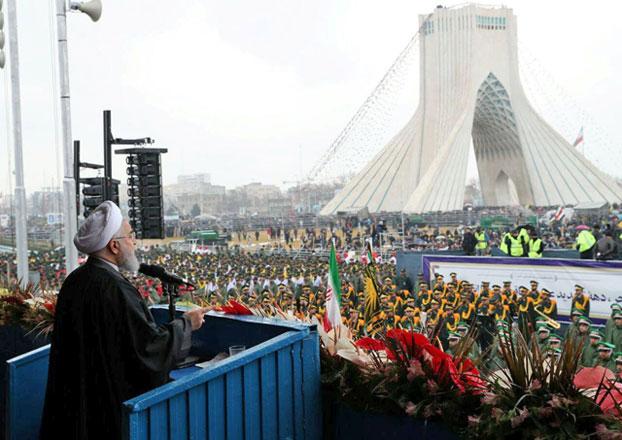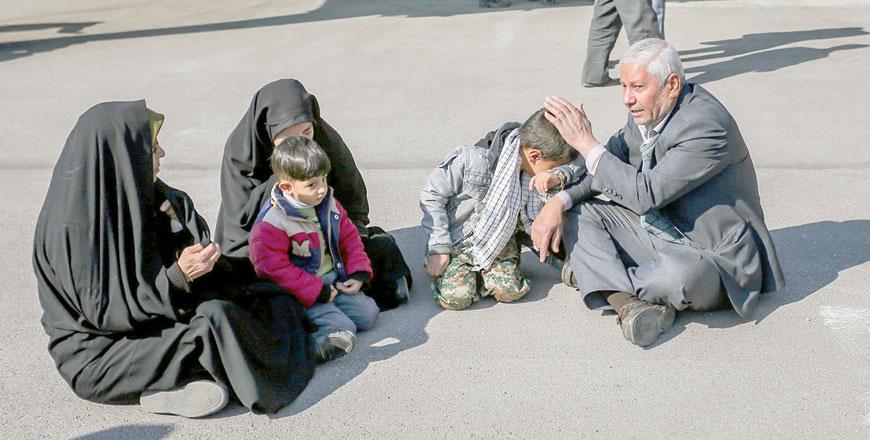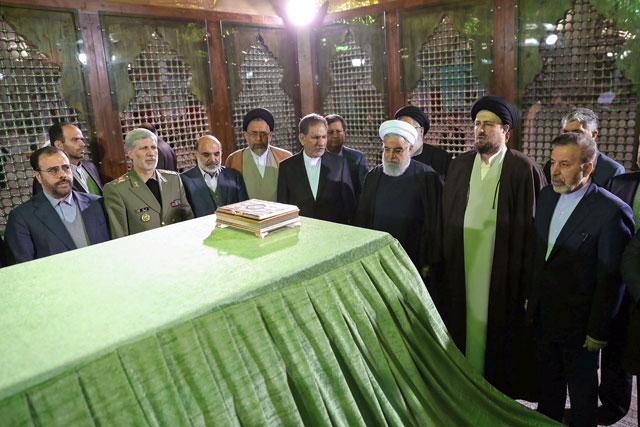You are here
Iran taunts US on revolution's 40th birthday
By Reuters - Feb 11,2019 - Last updated at Feb 11,2019

Iran's President Hassan Rouhani speaks during a ceremony to mark the 40th anniversary of the Islamic Revolution in Tehran, Iran, on Monday (Reuters photo)
DUBAI — Hundreds of thousands of Iranians marched and some burned US flags to mark the revolution's 40th anniversary on Monday as Tehran showed off ballistic missiles in defiance of US efforts to curb its military power.
Soldiers, students, clerics and black-clad women holding small children thronged streets across Iran, many with portraits of Ayatollah Ruhollah Khomeini, the Shiite cleric who toppled the Shah in an Islamic uprising that still haunts the West.
On February 11, 1979, Iran's army declared its neutrality, paving the way for the fall of US-backed Shah Mohammad Reza Pahlavi.
State TV showed crowds defying cold rainy weather and carrying Iranian flags while shouting "Death to Israel, Death to America", trademark chants of the revolution.
After decades of hostility with the United States, Tehran vowed to expand its military power despite mounting pressure from hostile countries.
Ballistic missile capabilities were on show during the main march, including the Qadr F, a ground-to-ground missile with a 1,950km range, according to Tasnim news agency.
"We have not asked and will not ask for permission to develop different types of... missiles and will continue our path and our military power," President Hassan Rouhani said in a speech at Tehran's Azadi [Freedom] square.
Economic ‘hardships and grievances’
US National Security Adviser Bolton, who in 2017 expressed hope Iran's "revolution will not reach its 40th birthday", Tweeted that after four decades the "Islamic Republic of Iran has failed to fulfil its promises to uphold and safeguard the rights of its citizens".
The large turnout in state-sponsored rallies, in which US and Israeli flags were burned, came as Iranians face mounting economic hardships many blame on the country's clerical leaders.
Pictures on social media showed some people also demonstrating against corruption, unemployment and high prices.
"Our presence in the 40th anniversary of the revolution is to show our support for the Islamic Republic," said one sign held by a protester.
"But it does not mean we support corruption of some officials and their betrayal of the oppressed people."
Reuters could not independently verify the pictures.
Last year, Iran cracked down on protests over poor living standards that posed the most serious challenge to its clerical leadership since a 2009 uprising over disputed elections.
Prices of basic foodstuffs have soared since President Donald Trump withdrew Washington from the 2015 nuclear deal last year and reimposed sanctions.
"I bow in admiration to Iran's resilient people who — despite hardships and grievances — today poured into streets by the millions to mark 40th anniversary of their Islamic Revolution, which some in the US wished would never come," Iranian Foreign Minister Mohammad Javad Zarif Tweeted.
"US should take note: REAL Iranians never succumb to dictates."
In January, Rouhani said Iran was facing its worst economic crisis since the Shah was toppled.
But he remained defiant on Monday, as Iranians recalled the end of a monarch who catered to the rich. "Iranian people have and will have some economic difficulties but we will overcome the problems by helping each other", he said.
US and Israeli ‘dogs’
Yadollah Javani, the Revolutionary Guard deputy head for political affairs, said Iran would demolish cities in Israel to the ground if the United States attacked.
Khomeini returned from exile in France two weeks after the shah and his wife flew to Aswan, Egypt. He was greeted by millions of supporters in Tehran. Revolutionaries later began executing supporters of the shah including four top generals.
Khomeini died in 1989 and was followed by Iran's current Supreme Leader Ayatollah Ali Khamenei.
Washington and the Arab world have viewed Iran with great suspicion since the Islamic Revolution, fearing Khomeini's radical ideology would inspire militants across the Middle East.
Today, the United States, its Arab allies and Israel are trying to counter Tehran's growing influence in the Middle East, where it has proxies in Syria, Lebanon and Yemen.
Iran also has vast clout in Iraq, where Major-General Qassem Soleimani, head of the overseas arm of Iran's Revolutionary Guards overseas division, was frequently photographed guiding Shiite militias in the war against Daesh.
"Defending the system and religion are inseparable," Soleimani was quoted as saying by Tasnim news agency during celebrations in his hometown.
Related Articles
TEHRAN — President Hassan Rouhani vowed revenge Thursday against the "mercenary group" behind a suicide bombing which killed 27 troops in so
TEHRAN — Ayatollah Ruhollah Khomeini was an austere and charismatic cleric who became an icon of the 20th century for standing against the W
DUBAI (Reuters) — Like many Iranians, retired judge Mohammad Reza made big sacrifices to help Ayatollah Ruhollah Khomeini launch his Islamic



















